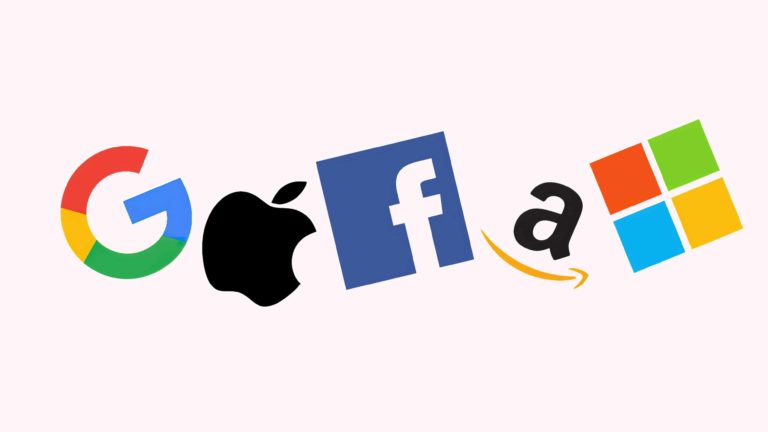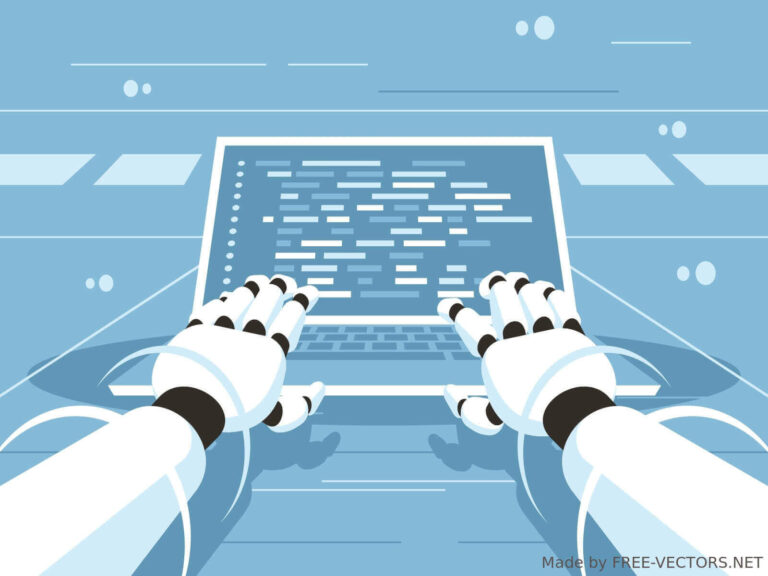Big tech companies: The advantages, the danger & the future
Big tech refers to huge technological companies with millions of daily users. But, are they beneficial or dangerous to society at large? We take a look here.

Big tech companies are multi-national corporations that own assets around the world, often earn billions in revenue, and make lots of impact on the daily lives of their users.
Most big tech firms were disruptors as startups – they changed their respective industries by implementing new ways of getting things done. Then, they eventually grew into large and powerful organizations, but without the necessary political responsibilities.
GAMAM stands for Google, Amazon, Meta, Apple, and Microsoft, as they are your typical big tech companies. However, the characteristics of big tech are not limited to them alone, because there are many other companies on the same path. This post looks at them all.
How Big is Big Tech?
Consider that a country like Denmark has an estimated 2021 GDP of about $290 billion. Also consider that Bulgaria had an estimated $78 billion, with Panama at $60 billion, New Zealand at $247 billion, and Jamaica at $15 billion. The GDP or Gross Domestic Product is the sum of all the value created by a group of people or a country in a given year.
| Country | 2021 GDP | 2016 Government Revenue | |
|---|---|---|---|
| 1. | Poland | $655 billion | $236 billion |
| 2. | Slovenia | $60.9 billion | $20 billion |
| 3. | New Zealand | $247 billion | $72 billion |
| 4. | Kuwait | $132 billion | $61 billion |
| 5. | Pakistan | $286 billion | $43 billion |
| 6. | Romania | $287 billion | $72 billion |
Table 1.
Now take a look at Table 2 below to consider the revenues of the world’s largest technology companies in 2021, as well as their market cap figures. Market cap or capitalization is the total value of a company’s shares, calculated by multiplying the stock’s price with the total number of shares.
| Company | Sector /Products | 2021 Revenue | Market Cap | |
|---|---|---|---|---|
| 1. | Amazon | Retail, cloud computing | $470 billion | $1.7 trillion |
| 2. | Apple | Consumer electronics, software | $275 billion | $2.7 trillion |
| 3. | Samsung | Consumer electronics, software | $200 billion | $417 billion |
| 4. | Alphabet | Search, Google, YouTube | $182 billion | $1.7 trillion |
| 5. | Foxconn | Hardware maker | $181 billion | $51 billion |
| 6. | Microsoft | Software | $143 billion | $2.2 trillion |
| 8. | Huawei | Consumer electronics, software | $129 billion | — |
| 9. | Dell | Computer hardware | $92 billion | $45 billion |
| 10 | Meta | Software, Facebook, Instagram | $85 billion | $589 billion |
| 11. | Sony | Consumer electronics, software | $84 billion | $129 billion |
| 12. | Tencent | Video games, entertainment | $70 billion | $567 billion |
| 13. | Tesla | Electric cars, lithium batteries | $54 billion | $870 billion |
Table 2.
It should be obvious from Table 2 above that many of the world’s largest tech companies earn more revenue, and eventually profits than many of the world’s geopolitical entities or countries. And in a world increasingly controlled by capital flow, these high levels of income make big tech companies potentially dangerous. This is because they have the resources to pursue a wide range of interests, and to also mitigate most obstacles along the way.
The Cambridge Analytica Scandal
The apparent danger of having a single commercial entity managing records of millions of users became apparent to the public with the Cambridge Analytica Scandal.
As details emerged of how Facebook Inc. enabled Cambridge Analytica to harvest data from 87 million Facebook profiles without their consent, and for political reasons, everyday users began to show concern about how big tech uses the information they collect.
Asides from business use, tech companies should also protect their user’s data from malicious actors. But as the sensational Sony PlayStation Network hack of 2011 shows, many tech companies do not do enough. The hacker made away with the personal information of 70 million users, including their credit card numbers.
Advantages of Big Tech
There are many advantages and helpful features that big tech companies bring into our lives. Most modern lifestyles even depend on a combination of services from big tech companies. Here are some:
- Easy Access – Big tech companies make it easy for average people to access services that would have otherwise been impossible. Starting from the free but highly efficient Google search engine from the 1990s to social networks, cloud computing, and numerous other personal and business services.
The business model here is often the freemium model, where some of the service’s features are offered for free, while those who pay a premium get premium services in addition. A big example here is Google Cloud Computing and Amazon Web Services.
Other big tech business models include ad revenue as is with Google Search and Facebook. Then, there are also commissions as with Amazon and its sellers, as well as other varied methods. In a nutshell, big tech makes necessities available to everyone, while allowing the successful ones to cover the costs for others. - Extensive Features – Through iterative and incremental development, big tech is also able to offer more features of any particular service than you would otherwise get. This comes as a result of the companies’ deep liquidity, a vast army of engineers and developers, as well as paying customers.
- Optimized Services – This is where big tech shines because of big data. Given the continually decreasing prices of data storage, computing power, and bandwidth, big tech companies can leverage new opportunities from artificial intelligence to create better products.
This could mean optimizing their services to better serve individual users, as well as discovering usage patterns, demographics, and other AI-enabled results that make it easier to provide a better service and earn more. - Efficient Research & Development – Another benefit of big tech is their long-term investments in research and development. By leveraging their solid incomes, the tech giants invest much farther into the future than conventional corporations would. The result is continuously better, diverse, or cheaper products and services.
- Good & Stable Jobs – Big tech corporations are no doubt the best places for engineers, developers, managers, and other creative talents to find stable and profitable jobs. Not only do they pay very well, but they also compete by offering the best employee perks. Except maybe, Amazon.
Dangers of Big Tech
There is no doubt that the vast social power, wealth, and computational resources of big tech make them potentially dangerous to society at large. Each company has its strengths and weaknesses, so the risks they pose are not uniform across the board.
The following, however, is a summary of the major threats that big tech companies pose to the world at large:
- They know Everything – Most tech companies know where you live, where you work, and the things you like. Google, for instance, may first know when your wife, girlfriend, or daughter gets pregnant before you. Others like Amazon might know how healthily you may be or actually are, from your lifestyle purchases.
- Dangerous Data – If you are a top politician from an Asian or middle-eastern country, then you don’t want to be on Facebook all day. Because your data can easily land in the wrong hands and possibly jeopardize your national security. The same goes for people of lesser power and status.
- Data Privacy – While different countries have different approaches to the privacy of individuals, the European General Data Protection Regulation (GDPR) remains the toughest security and privacy law on the planet. The truth is, big tech tries to circumvent these laws as much as possible.
- Competitor Discrimination – Business can be brutal, so the sheer size of these big tech corporations lets you know how brutal they have been to their competitors over the years. Some even go as far as suppressing great products, like when Apple Inc. bought the German Emagic GmbH and killed the development of their amazing Logic Audio for the Windows platform. This was simply so you can only get it on a Macintosh. A devilish move. 😈
- Money Corrupts – Everyone knows this one, so not much to say here.
- Monopoly – Apple Inc. bought ‘Beats by Dr. Dre’ in 2014, sending the old-school rapper to billionaire net worth ratings. The funny thing is that while these headphones and earbuds sell for hundreds of dollars, they cost just a reported $15 to make.
- Twitter Revolutions – Social media has been responsible for everything from the Arab Spring to the U.S. Capitol insurrection of January 2021, and countless other social unrests, civil disobedience riots, and their accompanying human casualties. At the top of this media list is Twitter.
- Free Speech & Social Control – When one or a few people have the right to ban any account or delete any group or political movement from their platform, then they have more powers than most ordinary government officials. The only problem is that they are not elected to their functions.
Politicians Are Clueless About Big Tech
The case for serious regulation of big tech is clear. But the average politician is clueless when it comes to the sheer power, capability, reach, and real-world clout of these tech behemoths. It takes a sound understanding of computers and technology to envision what an executive with lots of money and computing power can do.
Still, it is only the politicians that have the power to keep big tech in check. Some industry sectors need tighter regulations, some companies need to break up to foster better competition, and so on. But in the meantime, big tech is spending millions of dollars lobbying these lawmakers.
Other countries like China and Russia have taken more brutal approaches and simply banned select big tech services from operating in their countries.
The Future With Big Tech
If lessons from the past are anything to go by, then technology will continue to play a major role in our lives. But whether that role is managed by big tech or a different organizational structure is an entirely different issue.
Big tech is a product of capitalism, so it can only thrive as we know it today in a capitalist society with relative security and a stable economy. Change any of these basic variables and big tech has no chance in that geographical region.
Eastern countries like China and Russia have ingenious innovators and lots of impressive indigenous technologies. However, unlike western governments, for instance, the Chinese leadership takes a more active part in the operations of their domestic tech companies. And this makes a company like Alibaba, for instance, become a slightly different kind of tech giant.
In Africa, where technological innovation is relatively low compared to the rest of the planet, politicians make little or no effort to provide the basic infrastructure that is taken for granted elsewhere. Without constant electricity, cheap bandwidth, and access to low-interest capital, it becomes a near impossibility for even the smartest of founders to launch and grow a startup into a big tech company.
As Russian troops attacked Ukraine in February 2023, the crypto industry lost over $200 billion in value within a short period. And while no one knows how long this conflict might last or what might become of it, one obvious fact is that the future of big tech depends on the political landscape of a territory.
This boils down to capitalism and all its tenets. Surely, most big tech shares are overvalued as investors seek out sure bets. But as the stock markets have shown, many of today’s tech giants may become a shadow of themselves in 10 to 15 years. The simple reason being that new inventions and disruptions are the engines that drive change in the tech industry.
In summary, the Pareto Principle shows us that nature is never even across the board – there will always be a few that control the many values of any society. And as the big pharma and other theories show, big tech companies will probably always be around. Only the players might change over the years.
Notable Big Tech Executives
The big tech companies on their own are nothing without the men and women that run the show behind the scenes. From the innovations to marketing and growth stages of any organization, it is the quality of its management that matters the most.
So, here is a list of some of the most notable tech industry pioneers and leaders, who have helped to either steer their companies profitably or turn them into tech giants.
- Jeff Bezos – Founder and leader of Amazon
- Elon Musk – Investor & CEO of Tesla
- Larry Page – Google co-founder and former CEO of Google & Alphabet Inc.
- Eric Schmid – First CEO of Google Inc.
- Jack Ma – Founder and chief of Alibaba
- Steve Jobs – Co-founder of Apple Inc. and chief guru of the Apple cult
- Bill Gates – Microsoft co-founder and former chief
- Jack Dorsey – Controversial Twitter founder and chief
- Sergei Brin – Google co-founder and former president of Alphabet Inc.
- Larry Ellison – Oracle founder and chief
- Tim Cook – CEO of Apple Inc.
- Mark Zuckerberg – Founder and chief of Facebook (Meta)
- Satya Nadella – Current CEO of Microsoft
Conclusion
Reaching the end of this post, you have seen the companies that make more money than the majority of governments around the world. And you have also seen what they do and how they do it.
In the end, it is up to you to make up your mind about big tech and your life. One thing for sure is that concentrated market power is dangerous to any society, as it skews the benefits of capitalism and democracy.





